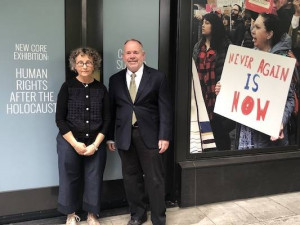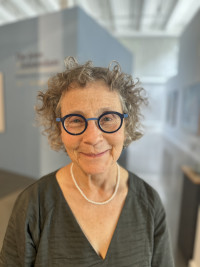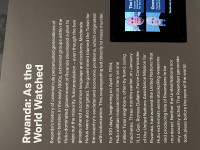




OJM Human Rights KBOO blurb
On Tuesday, June 27, 2023, at 11.30 a.m. Joseph Gallivan interviews Scott Miller and Judy Margles about the new permanent exhibit at the Oregon Jewish Museum, Human Rights after the Holocaust. They talk about five of the 30 articles of the UN’s Declaration of Human Rights spurred by the Holocaust, who the exhibits are set up with objects as well as text, photos and video, and how visitors can turn the inevitable negative feelings into hope though action.
Judy Margles is the Executive Director of OJMCHE and Scott Miller is the former chief curator at the United States Holocaust Memorial Museum in Washington DC.
This interview was recorded on June 20, 2023, using Zoom H2n recorder and engineered by KBOO volunteer Ray Bodwell. https://kboo.fm/blog/55224
FROM THE PRESS RELEASE:
https://www.ojmche.org/events/human-rights-after-the-holocaust/
Pioneering in its global scope, Human Rights After the Holocaust calls on visitors to ponder the work needed to achieve dignity and rights for all persons. It explores why and how human rights abuses, hatred, racial injustice, and genocide continue to happen and, simultaneously, illustrates the ways that hope and action are essential to our endeavors. The exhibition received funding from the Kryszek Family in memory of Jakob and Sala Kryszek, survivors of the Holocaust.
HUMAN RIGHTS AFTER THE HOLOCAUST: NEW CORE EXHIBITION SET TO EXPAND REACH OF OJMCHE
By Debra Shein
The Oregon Jewish Museum and Center for Holocaust Education (OJMCHE) has acquired the Charles Hartman Gallery next door and is now working on transforming the space into a new core exhibition, Human Rights After the Holocaust, and integrating it with the existing museum. Executive Director Judy Margles enthuses that “This will allow OJMCHE to dramatically enhance its power to accomplish its core mission, which includes ‘exploring the lessons of the Holocaust and fostering intercultural conversations,’ by expanding to include a focus on today’s experience of hate, racism, discrimination, and persecution.” The exhibition, slated to open in June of next year, is being developed by Scott Miller, former chief curator at the United States Holocaust Memorial Museum in Washington DC, who has also been a part of the curatorial team at the Museum of Jewish Heritage in New York for its newly-opened exhibition, What Hate Can Do.
In a recent conversation, Miller defined human rights as “the inherent and inalienable rights of all human beings to freedom, dignity, and justice — and protection from oppression, violence and terrorism, slavery, racism and discrimination, and genocide.” He emphasized that this is a wide topic and it’s challenging to select from all of the possible issues that might be addressed. However, in designing the exhibition, he has narrowed the subject matter to three of the most salient areas of concern in the post-WWII era: genocide, refugee crisis/displacement, and domestic civil rights issues. The focus will be local as well as global in scope.
Human Rights After the Holocaust will bring historical events to life with archival photos and film footage, which in recent decades, remarkably, have recorded the details of genocides and other human rights abuses in real time. These will be accompanied by a collection of artifacts, 3D objects that might range from children’s drawings to diaries to everyday objects such as domestic items and toys. Miller reflected that such objects “humanize experience” and make the abstract tangible. Although the trend in museum exhibits on human rights has been to incorporate personal stories and not focus solely on the big picture, he noted, many museums fill their spaces predominantly with photos and film; they neglect the opportunity to make an even greater impact by featuring objects that help visitors better imagine the lives of those whose stories are being documented. Miller is currently conducting an international search to find representative items to include in the exhibition and hopes that people in Portland will hear about the project and contribute (see sidebar).
But it’s important that the exhibition will not keep its eyes strictly on the past. Its concluding portion will leave space for highlighting the constantly and rapidly evolving news on the latest human rights abuses taking place in the world. It will also look at what can be done at the local and national level to help, and interactive stations will encourage visitors, most especially students visiting on group tours, to explore and learn more.
Spending 30 years at the US Holocaust Memorial Museum and immersing himself in that material has “made me sensitive to the past and also to the future,” Miller asserted. “Genocide is still occurring, and civil rights abuses have never stopped. History is ongoing, not confined to the past.” He additionally reflected that “The title of the exhibition, Human Rights AFTER the Holocaust, was chosen deliberately. Why are we still talking about this event 75 years later? Today’s happenings are connected. The term ‘genocide’ was coined as the result of the Holocaust; it did not exist before.” Miller continued by discussing how new hopes were born in the immediate post-Holocaust era. Generous and inclusive refugee policies followed in its wake, civil rights initiatives sprung from the WWII desegregation of the Army, the UN was inspired to create the Declaration of Human Rights, and the Nuremberg trials provided a model for holding perpetrators accountable in later acts of genocide.
“Even when current situations are not of the same scope or horror,” Miller added, “there are lessons to be learned from the Holocaust, that racism and extreme ethnonationalism produce such hatred that it can bring this world to lining up 8,000 Muslim men and boys in the killing fields of Srebrenica, Bosnia, and shooting them. What happened there is not the same as what happened in the Holocaust, but there’s a lesson to be learned about what hate can do, and things are close enough that you want to say, ‘We’ve got to stop this now.’”
Human Rights After the Holocaust promises to be a profound and moving exhibition, one with widespread appeal that will also be able to play a significant role in helping to support the bill passed in 2019 by the State of Oregon mandating Holocaust and genocide education while helping OJMCHE to extend its reach. As Miller concluded, “There’s nobody who’s not affected by human rights abuses. History is now.”
Art Focus on K-B-O-O Portland is the show where artists talk about their work. I want to remind you that KBOO is a volunteer-powered community platform. That means we are funded by you, the listener.
If you are enjoying the program, please show your support by making a contribution today, or better yet become a monthly sustaining member.
Just go to kboo.fm/give or text K-B-O-O to 44-321."
To hear previous episodes of Art Focus or any of our KBOO public affairs programming, just go to KBOO dot F-M or listen on iTunes, Google Play, or wherever you get your podcasts.
Joseph Gallivan has been a reporter since 1990. He has covered music for the London Independent, Technology for the New York Post, and arts and culture for the Portland Tribune, where he is currently a Feature Writer. He is the author of two novels, "Oi, Ref!" and "England All Over" which are available on Amazon.com
- KBOO


